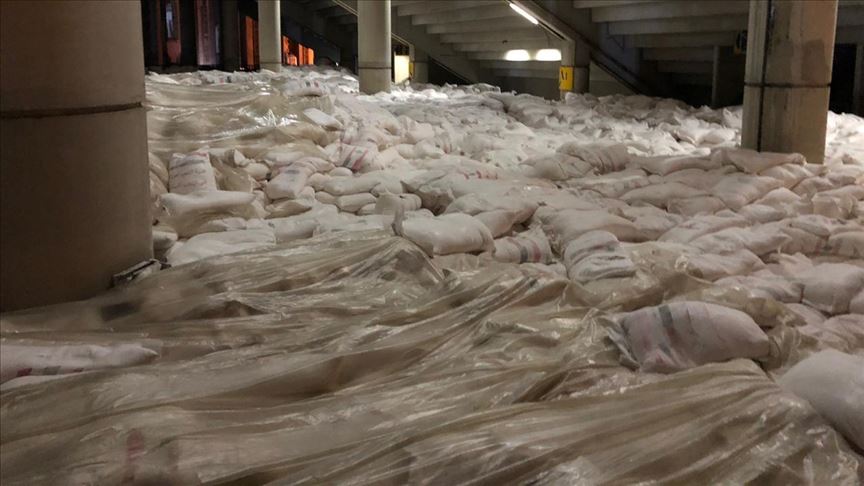
[ad_1]
Beirut / Wasim Saif Al-Din / Anatolia
On October 12, the Iraqi government sent 10,000 tons of wheat flour to help Lebanon, following the explosion of the Beirut port.
Rainwater flooded large amounts of aid that were stored in a sports facility.
On Wednesday night, tons of wheat flour flooded the Lebanese capital, which Iraq had sent to help the country, after the Beirut port explosion on August 4.
On October 12, the Iraqi government sent 10,000 tons of flour to Lebanon, as part of the aid that arrived in the country after the port explosion.
Large amounts of this aid, which was stored in a sports facility in Beirut, were flooded with water after heavy rains, according to Anadolu Agency.
On Wednesday night, the municipality of “Ghobeiry” in the capital said, in a statement, that its teams “discovered a disaster in the warehouses of the Sports City.”
The municipality added: “Flour (flour) is subject to water, humidity and air … Thousands of tons of Iraqi aid are poorly stored under the stands and in the lower aisles.”
Videos have been posted on social media platforms showing tons of flour and water flooded at a sports facility in Beirut.
After that, the economy minister in the interim government, Raoul Nehme, tweeted: “About 7000 tons of flour have been temporarily stored in the Sports City, due to the efforts of the Lebanese army.”
He explained that the flour “would have been distributed in stages to ovens and mills, so that the Lebanese could benefit from the gift by increasing the weight of the bundle of bread.”
And he continued: “The photos that circulated on social networks show materials that were damaged during the process of unloading and transporting the merchandise,” without details.
The Lebanese official was the target of a campaign of criticism on social media platforms, as he was asked to reveal the other warehouses where Iraqi aid was stored.
In turn, the general director of Sports Facilities in Lebanon, Riad Al-Sheikha, said in a statement published by the official news agency, on Wednesday night, that “the flour is stored for the benefit of the Ministry of Economy, at your request, for a period of 15 days until it is distributed, and we have no connection with this matter. ”
For his part, the mayor of Ghobeiry, Maan al-Khalil, stated that “sacks of flour were stacked on wooden bases due to poor storage, which caused some deterioration, while insects invaded others.”
In an interview with the local newspaper, Akhbar Al-Youm, on Thursday, Al-Khalil expressed surprise at the lack of distribution of flour to deserving parties, adding that “the municipality of Ghobeiry does not have the authority or logistical capacity to carry flour “.
There was no statement from the Lebanese government explaining the amount of flour that was submerged in the water, until 09:35 (GMT).
On Wednesday, several Lebanese regions, including Beirut, witnessed stormy weather, during which heavy rains fell, accompanied by thunderstorms.
The news published on the official page of Anadolu Agency, is an abbreviation of the part of the news that is presented to subscribers through the News Streaming System (HAS). To subscribe to the agency, contact the link below.
[ad_2]